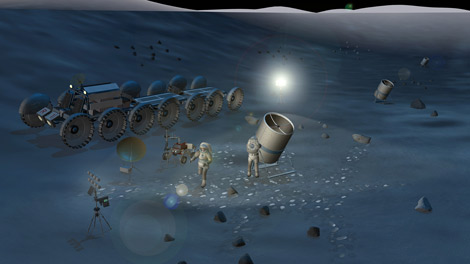Water on the Moon can affect telescopes
Detecting water on the Moon may open up hope for a new settlement for people. However, a study by Chinese scientists said water on the Moon could affect their plan to install telescopes on the satellite in 2013.
>>>Discovering the planet can live near Earth

Telescope model installed on the Moon. (Photo: Stfc).
Initially, scientists thought that the surface of the Moon was completely dry. But this hypothesis changed in 2009 when observations from the spacecraft of the US Aeronautics and Space Agency (NASA) showed evidence of the existence of water on the Moon and millions of tons. tape at 2 poles of this satellite.
Recently, a study by scientists from the Chinese Academy of Sciences showed that water molecules on the Moon when evaporating may interfere with the signals of Chinese telescopes intended to be installed. on the moon.
' Last year, scientists discovered water molecules that exist on the Moon, ' said Dr. Zhao Hua, an astronomer at the Chinese Academy of Sciences. ' However, the Sun's ultraviolet rays can separate water molecules in the process of evaporation into hydrogen and hydroxyl ".
The researchers found that hydroxyl molecules - made up of a hydrogen and oxygen atom - with high concentrations on the Moon could interrupt or distort the signals of telescopes on the surface of the Moon. .
" At certain ultraviolet wavelengths, the moon's hydroxyl molecules will scatter. This scattering process will affect telescope observations during sunshine ," said Dr. Zhao Hua. said.
The idea of building a telescope on the Moon was discussed since the US and Russian Space Agency cooperated to bring people to the Moon. Because scientists believe that the construction of the moon on the Moon has some advantages over building telescopes on Earth, such as a cloudless sky and less affected by earthquakes. shock.
- Water on the Moon distorts the telescope
- Put the telescope on the moon
- New NASA research: Water and humans can be found on the Moon, so come back soon
- Search for water on the moon thanks to space exploration devices
- Where does the Moon's water come from?
- The moon contains water from its formation
- Detecting water on the surface of the Moon
- Science may have found water right on our Moon
- The Hang Nga 3 probe failed to find water on the Moon
- The water on the Moon comes from a comet
- Water on the moon may originate from Earth
- There is water in the Moon Stone
 Van Allen's belt and evidence that the Apollo 11 mission to the Moon was myth
Van Allen's belt and evidence that the Apollo 11 mission to the Moon was myth The levels of civilization in the universe (Kardashev scale)
The levels of civilization in the universe (Kardashev scale) Today Mars, the sun and the Earth are aligned
Today Mars, the sun and the Earth are aligned The Amazon owner announced a secret plan to build a space base for thousands of people
The Amazon owner announced a secret plan to build a space base for thousands of people